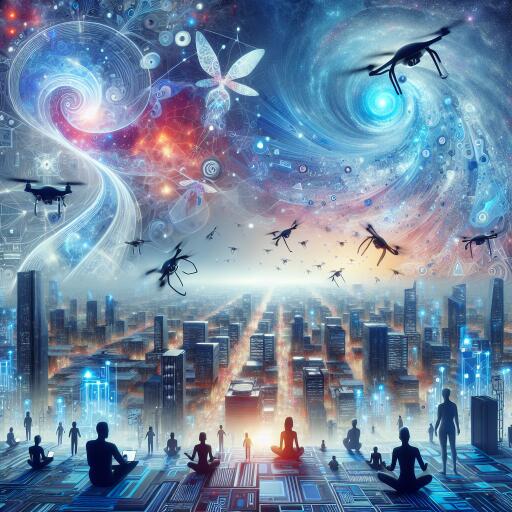Exploring AI’s Transformative Impact on Society and the Economy
The evolution of artificial intelligence (AI) from its nascent stages in the 20th century to the sophisticated systems shaping our world today has been nothing short of revolutionary. The development of AI challenges our traditional understanding of technology’s role in society, raising crucial questions about equity, ethics, and the very structure of global capitalism.
At its core, AI’s advance touches upon a fundamental contradiction of capitalism: the tension between technological progress and its equitable distribution. This quandary spans various domains of application – from medical diagnostics and personal surveillance to autonomous vehicles and automated retail experiences. The critical issue is not only about who benefits from these innovations but also about who decides on their deployment and governance.
Historical perspectives on AI, as envisioned by thinkers like Karl Marx, highlighted the transformative potential of machines that could replicate human skills. Though once relegated to the realm of science fiction, today’s AI systems, evidenced in developments like augmented reality (AR), virtual reality (VR), and the Metaverse, are now a reality, albeit concentrated in the hands of a few major corporations. These developments usher in a myriad of ethical, legal, and political challenges, particularly regarding data ownership and creative rights.
For instance, the question of authorship in AI-generated content—whether the programmers who designed the AI or the myriad users whose data trained the systems—remains unresolved. As industries increasingly integrate AI, from generating deepfake content to enhancing military operations, the implications for privacy, security, and the essence of human creativity intensify.
Moreover, AI’s requirement for substantial capital investment underscores the capitalist dynamic of profit maximization at the expense of labor. The automation of work processes poses significant implications for employment and income distribution, exacerbating the capitalist dilemma of balancing profit generation with societal well-being.
In an entirely automated future, a paradox emerges: if robots undertake all labor, eliminating the need for human work, how would the capitalist cycle of production and consumption sustain itself? This scenario has led some of technology’s most prominent figures to advocate for a universal basic income as a solution to maintain capitalism’s viability in an automated world.
Yet, the journey towards such an automated utopia is fraught with economic and social hurdles. As AI intensifies the organic composition of capital, the resulting strain on profit margins could precipitate economic crises long before a fully automated society becomes reality. The challenge, therefore, is not merely technological but inherently political and economic, requiring concerted action to navigate the transition towards a more equitable system.
The potential of AI to liberate humanity from the drudgery of labor while meeting societal needs is tantalizing. Historical experiments in leveraging technology for societal good, such as Chile’s Cybersyn project, showcase the potential for AI to harmonize production with social needs within a democratic socialist framework.
Internationally, countries like China recognize AI as a strategic pillar to counteract demographic challenges and enhance productivity across various sectors. Yet, the predominant drive toward AI development remains tethered to profit motives, often exacerbating existing societal inequalities.
The irony of capitalism’s progression is the escalation of ‘estrangement,’ wherein both laborers and capitalists find themselves subjugated by an impersonal system of production. The advent of AI, while accentuating these contradictions, also heralds the possibility of transcendence. It beckons a future where the alignment of technological advancements with communal interests could pave the way for a post-capitalist, more equitable societal structure.
In conclusion, AI represents a dual-edged sword: while offering unprecedented opportunities for technological and societal advancement, it also amplifies the inherent contradictions of capitalism. Steering this evolution towards a future that harmonizes technological progress with humanistic values requires collective resolve. The path to a more equitable society, possibly through the transformational potential of AI, rests in our collective hands.









